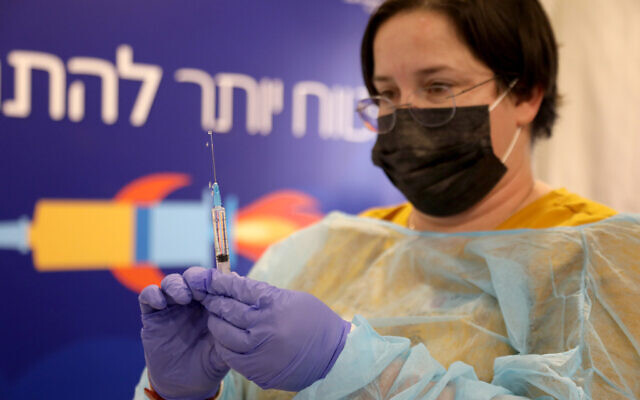Israeli data throws UK vaccine plans off course
Fears over second dose delay after study of 200,000 people showed only 33 percent efficacy after the first dose, compared to the 89 percent claimed by the UK

Israeli vaccine data showing much less immunity against coronavirus after one dose could radically alter Britain’s policy of delaying the second shot so more people can have the first.
Israel’s speedy response to the virus has led to it becoming “ground zero for vaccination data”, allowing Benjamin Netanyahu to negotiate an expedited shipment of the Pfizer/BioNTech drug by offering efficacy results in return.
Those results have now been published and the UK’s Chief Scientific Advisor Sir Patrick Vallance this week said he would look hard at the figures coming out of the Jewish state, where almost a quarter of the population have now had the jab.
He was facing questions from former Health Minister Philip Dunne, who said Israeli data from the Pfizer vaccine showed only 33 percent efficacy after the first dose, compared to the 89 percent claimed by the British Government.
“You don’t expect to get protection in the first ten days because it hasn’t had a chance for the immune system to build up,” Vallance told Sky News. “Some people may have been infected before they had the vaccine. If you take from Day 10, it looks more like the 89 percent, that’s the clinical trial data.”
He added: “I don’t know exactly what Israel are looking at. If they are looking from Day 0 then that doesn’t give an exact comparison, but we need to look at it very carefully. We’ll get the information from Israel, from us, and see what’s happening.”
The UK says delaying the second dose by up to 12 weeks gives more people the protection afforded by the first jab but Ronni Gamzu from Tel Aviv’s Sourasky hospital said the UK’s 89 percent efficacy claim after one dose was “very optimistic” and did not match Israel’s “real-world findings”.
Likewise, Israel’s coronavirus tsar Nachman Ash told Army Radio that a single dose appeared “less effective than we had thought”, and lower than Pfizer suggested, as the country recorded another 10,000 positive infections on Monday.
Pfizer advises doctors to give the two doses three weeks apart.
It comes after preliminary data from the first 600,000 Israeli recipients suggested that the jab halves the chances of infection within 14 days of the first dose.
Of these, 4,500 tested positive within seven days, with 244 hospitalisations, most of whom are thought to have caught the virus before they had the jab. From eight days, 124 people were hospitalised. Only seven more were admitted after 14 days.
Elsewhere, Sheba Medical Center said data from its employees showed that almost all those who had two doses developed 6-12 times more antibodies than those who had recovered from Covid-19, which is in-line with scientific thinking.
Alongside its vaccination programme, Israeli officials say they may introduce Covid-19 ‘immunity passes’, allowing the bearer to avoid most restrictions. Such a plan mirrors an idea floated by Downing Street in April, with so-called ‘freedom certificates’ allowing people to lead near-normal lives.

Thank you for helping to make Jewish News the leading source of news and opinion for the UK Jewish community. Today we're asking for your invaluable help to continue putting our community first in everything we do.
For as little as £5 a month you can help sustain the vital work we do in celebrating and standing up for Jewish life in Britain.
Jewish News holds our community together and keeps us connected. Like a synagogue, it’s where people turn to feel part of something bigger. It also proudly shows the rest of Britain the vibrancy and rich culture of modern Jewish life.
You can make a quick and easy one-off or monthly contribution of £5, £10, £20 or any other sum you’re comfortable with.
100% of your donation will help us continue celebrating our community, in all its dynamic diversity...
Engaging
Being a community platform means so much more than producing a newspaper and website. One of our proudest roles is media partnering with our invaluable charities to amplify the outstanding work they do to help us all.
Celebrating
There’s no shortage of oys in the world but Jewish News takes every opportunity to celebrate the joys too, through projects like Night of Heroes, 40 Under 40 and other compelling countdowns that make the community kvell with pride.
Pioneering
In the first collaboration between media outlets from different faiths, Jewish News worked with British Muslim TV and Church Times to produce a list of young activists leading the way on interfaith understanding.
Campaigning
Royal Mail issued a stamp honouring Holocaust hero Sir Nicholas Winton after a Jewish News campaign attracted more than 100,000 backers. Jewish Newsalso produces special editions of the paper highlighting pressing issues including mental health and Holocaust remembrance.
Easy access
In an age when news is readily accessible, Jewish News provides high-quality content free online and offline, removing any financial barriers to connecting people.
Voice of our community to wider society
The Jewish News team regularly appears on TV, radio and on the pages of the national press to comment on stories about the Jewish community. Easy access to the paper on the streets of London also means Jewish News provides an invaluable window into the community for the country at large.
We hope you agree all this is worth preserving.






















